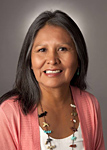
Maggie George
Las Vegas, N.M — Navajo Dine College President Maggie George’s distinguished career spans more than 30 years as an educator, teacher educator and administrator in tribal colleges and other higher education institutions. She is an alumna of New Mexico Highlands University.
Dine College in Tsaile, Ariz. serves residents of the 26,000-square mile Navajo Nation, which includes parts of New Mexico, Arizona and Utah. Founded in 1968, it is the first of 37 tribal colleges.
George is from Red Valley, Ariz. and is of the Tachii’nii clan, born for the Naakaii Dine clan. Her father was a traditional practitioner, her mother a homemaker. She said her family followed traditional Navajo pastoral ways with livestock and living off the land.
She attended boarding school and public schools on the Navajo reservation.
“I grew up in an era when it was a challenge to be an Indian, and only one of my teachers was Navajo,” George said. “I decided in junior high that I wanted to change that and teach Navajo children. Knowing who I was as a Navajo person — and being grounded in my identity, language and culture — helped me have confidence, competence and persistence.”
George earned her B.A. in elementary education and her M.A. in guidance and counseling from the Highlands University School of Education.
“I had some good education professors at Highlands: people who cared about me and mentored me,” George said.
She started her career as a K-12 educator and counselor at Bureau of Indian Affairs schools and Contract School in New Mexico. She went on to complete her Ph.D. in higher education policy and leadership from the University of Kansas.
Her doctoral dissertation examined bilingual/bicultural teacher preparation at Dine College.
“My research asked the question, ‘does it make a difference to have teachers who are like you and if so, how?'” George said. “The answer was yes, it makes a significant difference. Bilingual/bicultural Navajo teachers who include language, cultural traditions, and clan relationships in the classroom are more effective. These teachers also become change agents in the educational system.”
Over the years, George has served in numerous leadership positions at tribal colleges and other higher education institutions.
Examples include serving as executive director for the White House Initiative on Tribal Colleges and Universities in Washington, D.C., as dean for the School of Education at Haskell Indian Nations University in Lawrence, Kan., and as director for the American Indian Program at New Mexico State University. She was also a consultant-evaluator with the Higher Learning Commission.
George was the dean and academic vice president at Dine College from 2000 to 2005. She returned to Dine College in March 2011 as the chair administrator of the Center for Dine Studies before being named president in August 2011.
One of her first priorities as president was to review student data to inform her work.
“Understanding data is critical for shaping programs that support student learning and success,” George said. “Our mission is to provide our students with a quality education that reflects Navajo values.
“We are also looking at the issues facing the Navajo Nation to see how higher education can address some of those challenges, like workforce development, research and policy development,” George said.
George’s leadership philosophy guides her presidency.
“Leadership is not a solo journey,” George said. “It’s working as a team to make positive change.”
Fannie L. Attcity is the president of the Board of Regents for Dine College. She is a retired K-12 teacher who was also an adjunct education faculty member at the Highlands University Farmington Center.
“Dr. George’s vision is firmly focused on student learning and success, and the board supports this vision 100 percent,” Attcity said. “She has great depth of knowledge and expertise in higher education, and is a very data-driven CEO. She does her homework, and is excellent at making decisions and recommendations based on facts. As policy makers, this is extremely important to the board.
“Since she came on board last August, Dr. George has done an outstanding job of refining our strategic plan and goals, which give us a road map for the direction of the college as a whole.”
Attcity said George is a strong, collaborative leader who listens and communicates well.
“I give her an A+ for her ability to reach out to our Navajo Nation communities and assess how the college can be of assistance,” Attcity said. “I believe that the Navajo Nation as a whole is very proud of having such an accomplished bilingual educator as the Dine College president. People are very comfortable with her because she’s one of us who has returned.”
